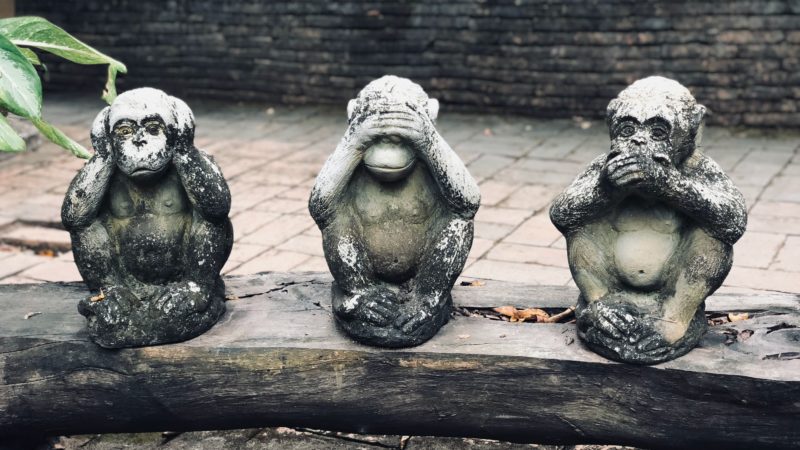Conspiracy theories are on the rise! Or are they? Surveys and the media have often painted an alarming picture in recent years. This „panic“ is dangerous for a democracy, says psychologist Magda Osman, the reality is much more nuanced.
Why we shouldn’t panic about the rise of conspiracy theories
Mrs Osman, why shouldn’t we panic about the rise of conspiracy theories?
It is a bold statement to say that conspiracy theories are on the rise thanks to the internet and especially social media. There needs to be very clear evidence to actually make that claim, but the picture is more nuanced than many polls and news stories suggest.

But aren’t there more conspiracy theories floating around because of social media?
Yes, possibly, but we need to have an agreed way of counting the number of conspiracy theories and comparing it with another period where we thought there were fewer. It is also wrong to think that seeing more misinformation on social media automatically leads to bad beliefs and bad behaviour. It is also wrong to think that truth and facts automatically lead to good beliefs and good behaviour. You have to give people more credit. If one person tells another about a theory that’s floating around on social media, it doesn’t necessarily mean that the person actually believes it. There are various reasons why people share misinformation, such as status-seeking1, to please others2, or simply for amusement3.
But even if a person spreads misinformation just for amusement or to please others, isn’t it still dangerous for others who might believe it?
To be clear, I am not saying that information that is published about controversial issues has no influence on people’s thinking and behaviour.
But if you are going to create a moral panic, as some polls and news has done, then you really need to be very clear about demonstrating the relationship between what you think people are encountering and the negative effects on their behaviour. If I present you with a headline or something that is in line with a particular conspiracy theory, I cannot precisely predict what you are going to believe as a result. This raises a host of other questions that don’t have good empirical answers. Such as “What is the underlying mechanism in our minds that changes beliefs? Is it consistent or is it inconsistent? Is it changing radically? Is it simply just confirming what we already know?” We just don’t know.
We can only look at correlations that give us a false sense of knowledge about people who believe in conspiracy theories, such as: Persons who believe in conspiracy theories have certain political views or live in certain areas. But it is problematic to categorise people into a political profile just because they believe in a “conspiracy” idea. You’re very quickly making broad assumptions about people based on a very small piece of information. Everyone, but especially journalists, people working in public policy or politicians, should be careful about making such snap judgments. Instead, we should think deeply about the reasons why people believe in conspiracy theories, before we judge about them.
What do you think are reasons for people to believe in conspiracy theories?
The thing about this question is that the answer is linked to what we want to refer to as examples of conspiracy theories. Unless we list the theories that we think are conspiratorial, and we collectively agree what the definition is, and that the examples are reasonable ones, then there is no way to answer this question. Is thinking that unidentified flying objects are real a belief in a conspiracy theory? Do we need to take into account how strongly people believe in this, and do we have an idea of how to measure what looks like a strong belief in this?
Also, over time, claims that were seen as heretical have become scientific fact, and some that were a consensus view of the world has been relegated to hokum. So, it would be peculiar to think that there would be some sort of personality trait for people that “believe” in what you think is a conspiracy theory. Let’s take an example like the lost city of Atlantis. If some people believed that it exists, then does it make sense to wonder, are all people that believe the lost city of Atlantis exists are similar, and believe it for the same reasons?
Of course, the rationale behind the question is: why is there a subset of the population that is deeply sceptical of or resistant to a certain set of positions that experts view should be widely adopted? Is there something that predicts who they might be? I’d say that the reason for scepticism and disengagement and distrust has less to do with belief in conspiracy theories per se, but rather a culmination of socioeconomic factors that have been destabilising people’s lives over several decades.
What exactly do you think is wrong with a survey that asks people about their belief in conspiracy theories?
When I see headlines like “Conspiracy theories are on the rise”, I ask myself: Which results are presented here? Because the specific statistics are important. And the framing can influence how people answer these questions and how people draw conclusions from the results.
You can either show what the vast majority tend to agree with, but that’s not interesting from a journalist’s perspective. Or you focus on what the small minority think, and then you get into the more controversial areas. For example, one of the most common claims that is presented as conspiratorial and that keeps showing up in polls is about the causes of climate change.
In 2008, one survey presented the claim “Climate change and global warming is a natural phenomenon that happens from time to time”, and 42% of the Britons agreed. In 2021, this was rephrased as “Climate change is not caused by human activity” and 14% agreed. In another survey, 8% of the UK population in 2021 agreed that “the idea of man-made global warming is a hoax that was invented to deceive people”. Each poll differs considerably in the way it phrases the claim, either explicitly calling it a hoax, or saying that it is not caused by humans or natural.
The same issue can also be presented in a “positive” way, focussing on the vast majority: In 2022, a survey in the UK found that 84% were concerned about climate change, “sometimes referred to as global warming”.
It also raises the question of what is an acceptable level of agreement? It’s hard to achieve 100% agreement, so is it good that 84% are concerned about climate change, or is it bad that 16% are not?
Isn’t it more a question of how the results are interpreted, for example by journalists?
Of course, journalists should be critical and at best not fall for such framing. Alarming results sound more exciting and certainly tempt many journalists to adopt them uncritically. Time constraints and staff shortages in newsrooms certainly play a role.
But the problem also lies in the survey itself and the way the questions are presented to people. One of the questions that tried to gauge the extent to which people were resistant to the idea of man-made climate change was: How much do you believe this statement? Well, that’s a very loaded way to phrase it. People want to present themselves in the best way possible and they realize that the questions are designed in such a way as to potentially make them look bad. When the title of the survey already says “we’re interested in looking at conspiratorial thinking”, people know to be careful about how to respond.
It also raises the question of whether it’s useful to ask people about their beliefs in the first place. Maybe they’re inaccurate because of social desirability effects.
The unreliability of opinion polls can also be seen regularly in election polls. In recent years, most of them have been radically wrong.
Is there a better way of asking people questions about their personal attitudes?
It is important to be more open to the idea that there are different factors involved in how people develop their beliefs and what beliefs they have conviction in. We also need to develop a better way of asking people about their beliefs and attitudes in good faith, rather than using it as a vehicle to show that people are generally dreadful or irrational.
We have known the problems of people giving responses that seem to conceal what they genuinely think since social science research in the 1940s’4. The problem isn’t new, but the interpretation of the problem changes over time along with the efforts to solve it. Basically, the tension is between whether people can consciously access their ‘true’ beliefs and attitudes, or whether it is buried in their unconscious, in which case directly answering them is fruitless because they can’t know the “true” answer themselves. What time we are living in societally tends to predict which one of these two positions we seem to favour.
You call for a stop to the panic over the rise of conspiracy theories. Why is this panic dangerous, in your opinion?
People are cautioning and justifying themselves before they say what they think. That’s problematic for democracy because it means that people are nervous about being sceptical about a certain claim or argument, and so are self-censoring. We can’t interrogate ideas and expose solutions to problems if people are fearful of reprisal if they say something that they think might not be socially acceptable. That starts to breed paranoia, and then that increases distrust because everyone is watching out for what others are saying and holding back on what they say. If we want people to participate meaningfully in addressing the big problems of our time, as many in the policy world are keen for us to do, then accepting that people might say things that are challenging is the outcome. We either find a way to develop a means of functional disagreement, where we make the best use of controversial and difficult views, or we increase the protective mechanisms to disable any expression of them.
- Lihong Wei, Jiankun Gong, Jing Xu, Nor Eeza Zainal Abidin, Oberiri Destiny Apuke, Do social media literacy skills help in combating fake news spread? Modelling the moderating role of social media literacy skills in the relationship between rational choice factors and fake news sharing behaviour, Telematics and Informatics, https://doi.org/10.1016/j.tele.2022.101910 ↩︎
- Chadwick, A., Vaccari, C., & O’Loughlin, B. (2018). Do tabloids poison the well of social media? Explaining democratically dysfunctional news sharing. New Media & Society, 20(11), 4255-4274. https://doi.org/10.1177/1461444818769689 Chen et al., 2015 ↩︎
- Acerbi, A. Cognitive attraction and online misinformation. Palgrave Commun 5, 15 (2019). https://doi.org/10.1057/s41599-019-0224-y ↩︎
- Cantril, H. (1944a). The Issues—As Seen by the American People. Public Opinion Quarterly, 8(3), 331-347. https://doi.org/10.1086/265693 ↩︎







